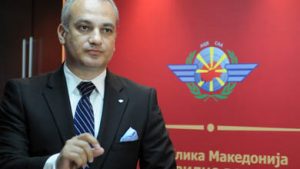Interview Catalin Radu, president of European civil aviation conference (ECAC)

Skopje, 10.06.2012
Currently Europe in a very difficult period regarding air traffic, largest companies have losses and the number of low-cost companies is increasing, they are more flexible and can create profit.
ECAC is and organization composed of 44 Member States, including Macedonia. What is your assessment regarding the Macedonian aviation authorities and for the general conditions in our air transport?
– The main purpose of ECAC is to promote safe, secured and durable transport at the European and international level. In this moment we are little more focused on the security since on the European level, there is no other organization dedicated to safety. Now, we are trying to achieve integration of 44 Member States at the European level and to implement and harmonize European and international regulations not only among the 27 Member States, but for all 44 Member States.
In terms of the assessment we have done so far, Macedonia is on the right track and it is even on the better level than other European countries. You have started the process of proper positioning of the aviation authorities in the country. One of the important things that you have managed to secure is political and financial independence of the Civil Aviation Agency. This immediately brings your organization to higher levels because what is important right now is that the passengers arriving here and the people who want to make business to see that you have good supervisory organization that can operate non-discriminatory and on transparent manner. In order to attract tourists into your country, it is very important that the aviation authority is strong and has good expertise. Aviation is an industry which requires high expertise and currently it is of utmost importance to provide full financial and political support for this organization. I think that you have great progress in the last two or three years and hopefully this trend will continue.
What is the current position of the air traffic in European in respect of the economic crisis, declining of the purchasing power of the citizens and reducing of the number of passengers, increasing of the price of the fuels? Is it going to lead to the closure of some airlines?
– Currently, in Europe is a very difficult period in terms of aviation since in the past two years most companies have losses. The concept HUB is changing and is currently losing money, and the concept of “point to point” brings some money and make profits. In this moment classical companies have more problems and the increase of low-cost airlines is in progress, so this is really difficult period for the air traffic. On the other hand, among the Member States of ECAC there are those who have succeeded to make profit, sometimes very high profits. From this point of view I was very glad when I saw that in Macedonia there is a growing trend in this business and that there is increased of traffic from 15 to 20 percent. This means that the strategy that has been adopted by your Government, to open and liberalize the market is good and now you have managed to do business in aviation. You have to be careful since aviation is a major driving force for the economy of a country. Therefore you should keep good services and to oversight companies that come here. More transport and more passengers at the airports reflex a need for more people in the aviation authority.
In Macedonia more low – cost air carriers are operating. It is also a trend in Europe. Can this type of companies provide the resources needed for the functioning of the aviation in a country required by the aviation authorities, air traffic control, airports?
– The concept of low-cost companies gives greater flexibility to the companies in order to respond to specific markets and is trying to optimize all processes within the company. They have new aircraft that do not require maintenance and exercise low rate margin. From the standpoint of safety and security of passengers, they are adequately safe since the aviation authority during the certification uses the same procedures as for classical companies. On the other way, companies that are owned by the states do not have such good management, can not allow themselves to give such good salaries and are not flexible regarding opening and closing of the markets. Sometimes it is better to have low-cost company, which will make sure that all charges in respect of the airport and navigation are covered for than to have a real company that can very quickly go bankrupt and cause problems in the aviation.
How many states for 44 ECAC Member States have liberated traffic, i.e. have applied the concept of Open Sky? Macedonia has the Open Sky concept. Was it performed by the other countries?
– Apart from the 27 EU Member States, there are certain countries that are not EU Members but are members of ECAC, providing Open Sky. On the other hand, some Member States have such access, trying to protect their companies. The Open Sky concept gives greater efficiency and greater economic benefit for the passengers. Mainly most ECAC Members have this kind of agreement. Macedonia is a tourist country and should pay much attention to the opening of the sky, toward liberalization and certainly should have good aviation authority.
However, the Open Sky is considered to be one of the reasons that Macedonia today does not have its own domestic airline. Not having its own air carrier the country is missing many opportunities of direct traffic and today it is much more complicated to reach a destination than before.
– Today it is difficult to define the term national carrier since currently in many countries the national carrier is not owned by the state but it is a private company. But the liberalization of the market currently leads to more efficient routes and more efficient companies on the market. On the other hand, the strategy of your Government to subsidize certain routes that you are missing is very good. Currently you are able to reinvigorate these routes. All companies on the market right now can apply and they can be better and more effective than national companies.
The idea for joining of the regional companies – Croatia, Serbia, Romania, into one joint company is being discussed. Is it feasible?
– In recent years there has been major consolidation in the market. If such project is well managed and if it is can be jointly operated, where there can be no separations in terms of management and everyone will not follow their own interest, the project can be successful. But issue of control rights is very important – who will be management and who will own the company? The state? How are they going to resolve that issue? In every respect, the idea is quite complicated for realization.
Zdenka Pavkovic
Archive
- 09.05. Aviation safety promotion
- 20.10.  
- 14.11. CAA became a member of JARUS
- 14.11. CAA visit BHDCA
- 14.11. Promotional flight Dubai
- 14.11. MACEDONIANS OVERLY EUROPEANS
- 14.11. Attention
- 09.11. Kurban Bajrami
- 28.10. Certificate of Gratitude
Archives
Calendar
| M | T | W | T | F | S | S |
|---|---|---|---|---|---|---|
| 1 | 2 | 3 | 4 | |||
| 5 | 6 | 7 | 8 | 9 | 10 | 11 |
| 12 | 13 | 14 | 15 | 16 | 17 | 18 |
| 19 | 20 | 21 | 22 | 23 | 24 | 25 |
| 26 | 27 | 28 | 29 | 30 | ||

